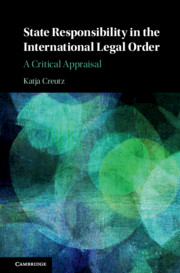Book contents
- State Responsibility in the International Legal Order
- State Responsibility in the International Legal Order
- Copyright page
- Contents
- Foreword
- Preface
- Acknowledgements
- Table of Cases
- Abbreviations
- Introduction
- 1 Contemporary Challenges to State Responsibility
- 2 The Evolution of State Responsibility
- 3 Problems in the General Law of State Responsibility
- 4 Alternative Constructions of Responsibility
- 5 Conclusions
- Select Bibliography
- Index
4 - Alternative Constructions of Responsibility
A Thematic Analysis
Published online by Cambridge University Press: 08 October 2020
- State Responsibility in the International Legal Order
- State Responsibility in the International Legal Order
- Copyright page
- Contents
- Foreword
- Preface
- Acknowledgements
- Table of Cases
- Abbreviations
- Introduction
- 1 Contemporary Challenges to State Responsibility
- 2 The Evolution of State Responsibility
- 3 Problems in the General Law of State Responsibility
- 4 Alternative Constructions of Responsibility
- 5 Conclusions
- Select Bibliography
- Index
Summary
International liability and international criminal law are presented as alternatives to the law of state responsibility. Both regimes have developed out of real-life incidents to which state responsibility has not offered a sufficient enough solution. With their respective focus on adequate compensation and the desire to penalize perpetrators for the most serious violations of international law, they represent qualitatively different approaches to state responsibility. A more limited test of functionality is conducted in order to analyze whether the practical utility of these two regimes is higher than concerning the law of state responsibility. Three criteria that are crucial to a well-functioning and practical responsibility regime are explored: social control, collectivity, and signalling effect. The thematic evaluation of the two responsibility regimes shows that in some respects these particularized regimes fare better than state responsibility while also suffering from problems internal to their particular regimes. The core of the matter is that both regimes have their own rationale from which they do not purport to slide.
Keywords
- Type
- Chapter
- Information
- State Responsibility in the International Legal OrderA Critical Appraisal, pp. 190 - 301Publisher: Cambridge University PressPrint publication year: 2020

